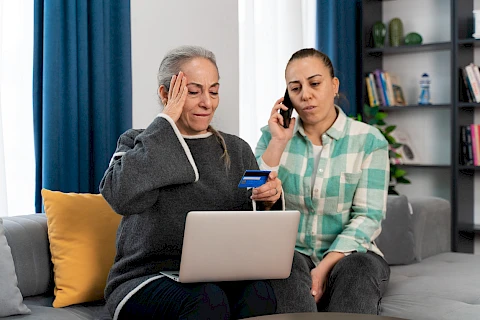
International Senior Fraud Awareness Day, celebrated on May 15th, reminds us of the financial pitfalls that can ensnare older adults. Due to their perceived vulnerability, scammers often target seniors, and being informed is the first line of defense. We'd like to help educate seniors, their families, and their caregivers about the common scams they might encounter and how to avoid falling prey to these malicious schemes.
1. Medicare and Health Insurance Scams
Medicare scams are pervasive, with fraudsters often masquerading as Medicare representatives. They may call seniors claiming they need personal information to issue a new card or verify account details. Always remember that Medicare will not call and ask for personal information. Contact Medicare directly through their official hotline before sharing personal information to ensure communications are legitimate.
2. Telemarketing and Phone Scams
Phone scams range from fake charity appeals to fraudsters claiming to be IRS agents. These calls often have a sense of urgency, pressuring seniors to make quick decisions. If you receive such a call, never rush. Hang up and verify the charity or organization through independent research—legitimate agencies will not demand immediate payments over the phone.
3. Internet and Email Scams
Seniors increasingly use the internet, making them vulnerable to phishing emails and fake websites. These scams can look official but are designed to steal personal information. Look for signs like generic greetings, misspellings, or urgent language. Never click on links or download attachments from unknown sources, and ensure your internet security software is up-to-date.
4. Sweepstakes and Lottery Scams
"Congratulations, you've won!" might sound exciting, but beware—a request for upfront fees or personal information should raise red flags. Legitimate contests won't ask for money to claim a prize. Always remember, if it seems too good to be true, it probably is. Confirm the legitimacy by checking with the official organization running the contest.
5. Grandparent Scams
Scammers may call seniors impersonating a distressed grandchild needing immediate financial help. Before taking action, pause and contact another family member to verify the story. Always approach such requests skeptically, even if the caller insists on secrecy.
6. Investment and Financial Scams
Promises of remarkable investment returns can be enticing but often signal a scam. Always research before investing and be wary of unsolicited offers. Consult with financial advisors or trusted family members and verify brokers' credentials through government websites.
How to Seek Assistance
If you suspect you've encountered a scam, know that reporting it is not a cause for embarrassment. Many seniors experience similar situations. For support, reach out to organizations such as the AARP Fraud Watch Network or your local law enforcement. Involving trusted family members or caregivers can also provide comfort and additional resources.
Stay Safe With Senior Helpers
Staying informed and vigilant is the best defense against scams. By understanding scammers' tactics, seniors can protect themselves financially and emotionally. Share this information with friends and family to help prevent scams in your community, and never hesitate to ask a trusted friend, family member, or caregiver for a second opinion when you think fraudsters might target you.
For more assistance and support with in-home care and companionship, Senior Helpers Southern New Hampshire is here to help seniors in Nashua, Hillsborough County, Rochester, Dover, and Salem. Contact us today. Remember, staying safe is a team effort, and we're here to support you every step of the way.